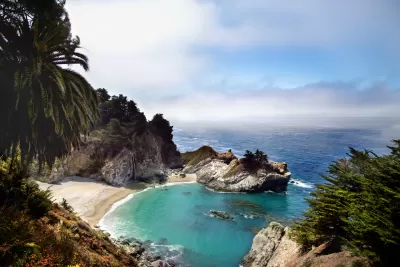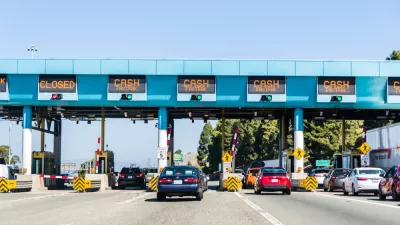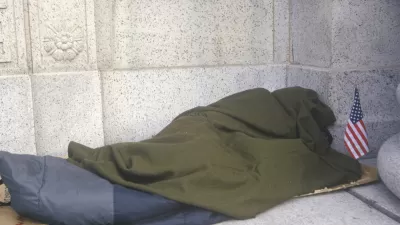Only one of the five propositions on California's June primary ballot is a general obligation bond measure. Prop. 68 authorizes $4 billion for projects benefiting parks and water quality. Opponents prefer a pay-as-you-go approach using general funds.

"A broad coalition that includes Gov. Jerry Brown, the California Chamber of Commerce, the American Heart Association and virtually every major environmental group in the state is backing [Proposition 68] on the June 5 ballot," writes Paul Rogers, natural resources and environment reporter for The Mercury News, which called it "one of the easiest decisions for California voters" in its March 5 editorial. In addition to parks, funds will go toward "natural resources protection, climate adaptation, water quality and supply, and flood protection," according to the ballot pamphlet.
Opponents, largely made up of taxpayer groups, say the state should instead fund parks from its general fund, and not through issuing debt. They also argue that too much of the money would go to urban parks in Southern California.
“We have a significant budget surplus [$8.9 billion],” said Jon Coupal, president of the Howard Jarvis Taxpayers Association. “Rather than going into debt, if these parks are truly a priority — and they are — why not finance improvements on a pay-as-you-go basis?”
The Fresno Bee editorial board on May 8 recommended a 'Yes' vote on June 5 on the first of the five propositions that appear on the ballot. [See May 22 post on Propositions 69 (transportation lockbox), 70 (cap-and-trade), and 72(rain barrels).].
It has been more than a decade since California voters were last asked to approve a statewide bond [Proposition 84] to upgrade parks and make sure the state’s water supply is clean and protected.
Roughly two-thirds of the money would go to build and maintain parks, and a substantial amount is set aside for park-poor communities such as those in the Central Valley. The rest of the bond is allotted to critical priorities such as getting clean drinking water to impoverished communities; protecting Californians from floods, wildfires and mudslides; replenishing groundwater; shoring up the levees in the Sacramento-San Joaquin Delta; and making it easier for homeowners and farmers to conserve precious water.
In his op-ed in the San Diego Union-Tribune on March 21, Coupal notes that it was only four years ago that voters passed "Proposition 1, the Water Quality, Supply and Infrastructure Improvement Act, giving the go-ahead for another $7.5 billion in bonds."
If approved by voters, the legislative analyst estimates that the total cost of Proposition 68, including interest, will be $7.8 billion.
We’ve already stuck [taxpayers] with an unfunded pension liability for public employees that has been estimated between $200 billion and $1 trillion.
[The Union-Tribune endorsed the measure on May 18.]
However, the taxpayers' groups have not mounted a campaign against the measure, notes Rogers, similar to Proposition 72 on residential rain-capture which lacks any opposition. Proponents have assembled a formidable war chest, mostly from open-space preservation groups.
As of May 9, the Yes on 68 campaign had raised $4.9 million and had $3.7 million left to spend. Major donors included the Nature Conservancy ($930,000), Save the Redwoods League ($350,000) and the Peninsula Open Space Trust ($300,000). [See op-ed in The Mercury News by POST president Walter Moore.]
Rogers lists the three main categories where the $4 billion goes, "with about two-thirds going to parks and wildlife, and one-third going for water and flood control projects." Borrowing costs will be $200 million annually, taking 40 years to repay using general tax revenues, according to the ballot summary.
The proposition stems from Senate Bill 5: California Drought, Water, Parks, Climate, Coastal Protection, and Outdoor Access For All Act of 2018, introduced by Sen. Kevin de León (D-Los Angeles).
Hat tip to News Headlines by the MTC-ABAG Library.
FULL STORY: Proposition 68: Will voters approve $4.1 billion for parks and water projects?

Planetizen Federal Action Tracker
A weekly monitor of how Trump’s orders and actions are impacting planners and planning in America.

Congressman Proposes Bill to Rename DC Metro “Trump Train”
The Make Autorail Great Again Act would withhold federal funding to the system until the Washington Metropolitan Area Transit Authority (WMATA), rebrands as the Washington Metropolitan Authority for Greater Access (WMAGA).

DARTSpace Platform Streamlines Dallas TOD Application Process
The Dallas transit agency hopes a shorter permitting timeline will boost transit-oriented development around rail stations.

San Francisco's School District Spent $105M To Build Affordable Housing for Teachers — And That's Just the Beginning
SFUSD joins a growing list of school districts using their land holdings to address housing affordability challenges faced by their own employees.

Car-Centric LA Suburb Looks to a Train-Oriented Future
City leaders in Rancho Cucamonga, the future western terminus of the Brightline West rail line to Las Vegas, want to reimagine the city as a transit-oriented, pedestrian-friendly community.

New Alaska Bitcoin Mine Would Burn as Much Energy as the State’s Largest Coal Plant
Fueled by “stranded” natural gas, the startup hopes to become the largest in the US, and to make Alaska an industry center.
Urban Design for Planners 1: Software Tools
This six-course series explores essential urban design concepts using open source software and equips planners with the tools they need to participate fully in the urban design process.
Planning for Universal Design
Learn the tools for implementing Universal Design in planning regulations.
Municipality of Princeton
Roanoke Valley-Alleghany Regional Commission
City of Mt Shasta
City of Camden Redevelopment Agency
City of Astoria
Transportation Research & Education Center (TREC) at Portland State University
US High Speed Rail Association
City of Camden Redevelopment Agency
Municipality of Princeton (NJ)





























